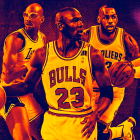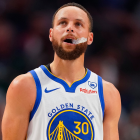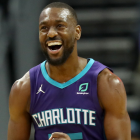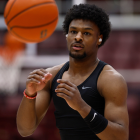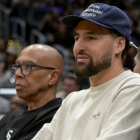Whether he'll admit it or not, Michael Jordan signed off on "The Last Dance" in order to end a debate. He agreed to participate in the film only after LeBron James won his third championship in 2016 and the notion that he might no longer be the greatest player in NBA history began to gain some momentum. But rather than end the debate against James, he wound up igniting a number of smaller ones that accumulate into a key question: What is NBA greatness?
Is one leadership style inherently better than others? Should all-time greats be held responsible for playing styles that would later be proven obsolete? How high do modern players need to climb in order to surpass their legendary predecessors?
CBS Sports is spending this week addressing NBA greatness in its past, present and future. We felt as though we had to put our chips on the table to really begin that debate in earnest. Our staff -- including longtime NBA players Avery Johnson, Rip Hamilton and Raja Bell -- weighed all of the above factors and more in voting on the greatest ever, ultimately landing on the following 15 as the cream of the crop.
15. Jerry West
1960-74: 27.0 ppg, 5.8 rpg, 6.7 apg, 162.6 Win Shares, 12-time All-NBA, 1-time champion
West's only crime was sharing a league with Bill Russell. That may have cost him some jewelry -- he lost in the Finals eight times -- but his numbers hold up to anybody in Lakers history. "Mr. Clutch" averaged more points per game for his career than Kobe Bryant, is the only player in team history to have led the NBA in both points and assists (albeit in separate seasons), made five All-Defensive Teams and won the first Finals MVP -- despite losing that series. Had the 3-pointer existed during his career, West likely would have been the league's first true marksman. He wasn't simply a jack of all trades -- he mastered most of them as well.
14. Julius Erving
1971-87: 24.2 ppg, 8.5 rpg, 4.2 apg, 181.1 Win Shares, 4-time MVP, 12-time All-NBA/ABA, 3-time champion
"Dr. J" may not have invented the slam dunk, but he certainly perfected it. His ABA highlights are the stuff of legend and helped paved the way to the NBA recognizing it needed to merge and couldn't simply pretend the ABA didn't exist. Erving is the bridge between the NBA's ground-bound past and it's high-flying present, the first in a long line of forwards who could beat you just as easily above the rim as they could beneath it.
13. Stephen Curry
2009-present: 23.5 ppg, 4.5 rpg, 6.6 apg, 103.2 Win Shares, 2-time MVP, 6-time All-NBA, 3-time champion
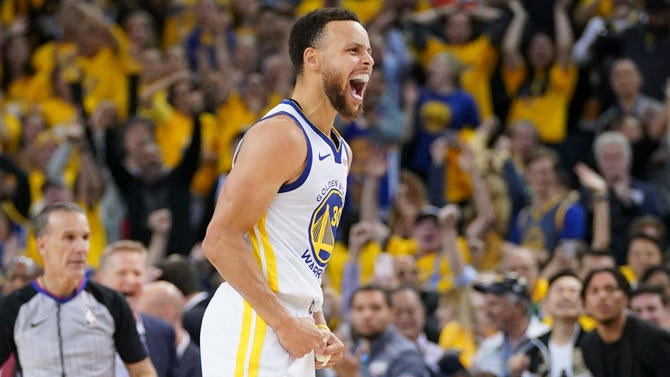
The only unanimous MVP in league history is also, more importantly, the linchpin of one of the great teams and runs we've witnessed. He is, beyond question, the greatest shooter the game has ever produced, breaking and redefining all records and perceptions of what it means to be a shotmaker. His greatness largely created the team that drew Kevin Durant to it, not the other way around, a fact too often overlooked. So was this: Those Warriors teams remained dominant with Steph on the floor and Durant on the bench, but not the other way around. The Warriors never win three titles without Curry. Each era gives way to a player who shapes and changes the game -- whose presence, and excellence, change the very way the sport is played. Curry, still only 32 years old, is that player for this generation.
12. Oscar Robertson
1960-74: 25.7 ppg, 7.5 rpg, 9.5 apg, 189.2 Win Shares, 1-time MVP, 11-time All-NBA, 1-time champion
Most probably know "The Big O" as the first NBA player to average a triple-double for a full season, but he also came within one rebound and/or assist of doing the same thing in four other seasons. At 6-5, Robertson laid the foundation for big, scoring guards to have NBA success, while also leading the league in assists six times. He won the MVP in 1963-64, and later took home his only career title while teaming up with Kareem Abdul-Jabbar on the Milwaukee Bucks. He also changed the NBA in another court, as his lawsuit opened the door to modern free agency.
11. Hakeem Olajuwon
1984-2002: 21.8 ppg, 11.1 rpg, 3.1 bpg, 162.8 Win Shares, 1-time MVP, 12-time All-NBA, 2-time champion
Everybody remembers the back-to-back titles, but Olajuwon was already 31 by the time he out-dueled Patrick Ewing in the 1994 Finals, with a decade of superstar-level production under his belt. On defense, he was the Bill Russell of his era, able to erase teammates' mistakes with his unreal quickness and anticipation. On offense, he wasn't quite as efficient as some of the other names on this list, but he is the rare franchise player who consistently performed better in the playoffs -- since he always took difficult, contested shots, the postseason wasn't much of an adjustment. Imagine if Houston had surrounded him with a halfway decent supporting cast in his 20s.
10. Kobe Bryant
1996-2016: 25.0 ppg, 5.2 rpg, 4.7 apg, 172.7 Win Shares, 1-time MVP, 15-time All-NBA, 5-time champion
The final two of those titles cemented Bryant in this top 10, but we should not look past the full body of work of the late legend. Kobe, a two-time scoring champ, is the fourth-leading scorer of all time and is in no danger of being caught by anyone any time soon. What's more, Kobe could dominate on both ends, as evidenced by his 12 All-Defense selections. He was named Finals MVP twice and league MVP once. Did he always channel his talents in the most productive directions? Probably not, and efficiency is what keeps him in this spot. But there wasn't anything he couldn't do on a basketball court, mentally or physically, and few players have ever won more. He must've been doing something right.
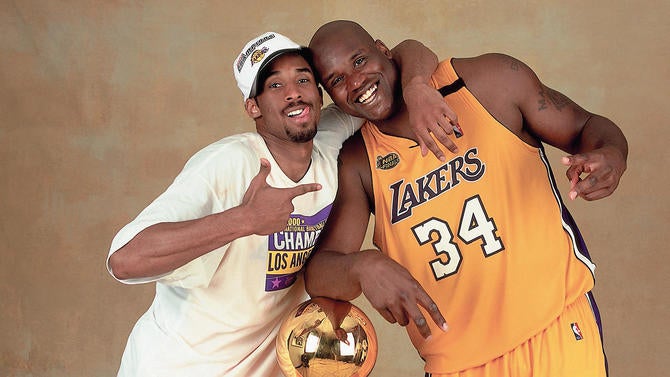
9. Tim Duncan
1997-2016: 19.0 ppg, 10.8 rpg, 2.2 bpg, 206.4 Win Shares, 2-time MVP, 15-time All-NBA, 5-time champion
Few players combined two-way excellence, consistency and longevity like Duncan, who made the All-NBA First Team as a rookie and the Third Team 17 years later. At his peak, he was a dominant rim protector and an automatic double-team in the post, silently shredding defenses with his footwork, touch and pinpoint passing. His surgical style, indifference toward attention and complete aversion to self-promotion meant he didn't resonate like his peers, and he might be even higher on this list if he hadn't been willing to sacrifice his individual statistics, first accepting a lighter minutes load to prolong his career and then accepting a smaller offensive role to empower his teammates. He gets bonus points for that stuff, as well as his understated approach to leadership.
8. Larry Bird
1979-92: 24.3 ppg, 10.0 rpg, 6.3 apg, 145.8 Win Shares, 3-time MVP, 10-time All-NBA, 3-time champion
Bird has a case as perhaps the most skilled player in history. A member of the ultra-exclusive 50-40-90 shooting club, his 6-9 length and high release allowed him to get his shot off against anybody. An eyes-in-the-back-of-his-head passer, he made everyone around him better. A ruthless competitor, he couldn't be stopped by anything but his bad back. His career wasn't as long as most of the other players on this list, but his prime and peak were right there with the best players we've ever seen.
7. Shaquille O'Neal
1992-2011: 23.7 ppg, 10.9 rpg, 2.3 bpg, 181.7 Win Shares, 1-time MVP, 14-time All-NBA, 4-time champion
O'Neal in his prime was utterly unguardable, to the point where other contenders needed to make sure they had a fleet of 7-footers on the roster in case he got the starter and the backup in foul trouble. He is remembered mostly for his sheer physical dominance, but there was always more to his game than power -- young Shaq had elite quickness before peak Shaq punished double-teams with his passing. His one MVP definitely undersells how thoroughly his presence distorted the game. A nightmare matchup, particularly if you had to deal with him for a whole playoff series.
6. Wilt Chamberlain
1959-73: 30.1 ppg, 22.9 rpg, 4.4 apg, 247.3 Win Shares, 4-time MVP, 10-time All-NBA, 2-time champion
Everything we said about Shaq can be said about Wilt, too. "The Big Dipper" scored 100 points in a single game. He averaged over 50 points for a full season. He never pulled down fewer than 18.2 rebounds per game in any season during his 14-year career, with a high of 27.2. Chamberlain is the stat king of the NBA, and he'll likely never be unseated from his throne. You can argue about competition level, but Chamberlain was basically the Babe Ruth of basketball during his era.
5. Magic Johnson
1979-91, 1996: 19.5 ppg, 7.2 rpg, 11.2 apg, 155.8 Win Shares, 3-time MVP, 10-time All-NBA, 5-time champion

In an era of positionless basketball, it has become insufficient to call Magic the "best point guard ever." He's simply one of the five best players ever, period. As a rookie playing center in place of an injured Kareem Abdul-Jabbar, Johnson, in one of the five most legendary performances ever, put up 42 points, 15 rebounds, seven assists and three steals to seal the 1980 championship for the Lakers. He appeared in the Finals in nine of his first 12 NBA seasons, winning five times. One of five players to register 10,000 career assists, Magic is arguably the best passer in league history and perhaps the best open-floor player period. At his size, with his full-court speed, post game, ball skills and flare for the dramatic, it's fair to say we'll likely never see another player like Magic.
4. Bill Russell
1956-69: 15.1 ppg, 22.5 rpg, 4.3 apg, 163.5 Win Shares, 5-time MVP, 11-time All-NBA, 11-time champion
When you have more championship rings than fingers, you've earned your place in the top four. Russell was the consummate winner and teammate, sacrificing individual stats for team success as the Celtics rattled off a never-to-be-matched 11 titles in 13 seasons. Speaking of stats, he likely would have led the league in blocked shots many times had they kept track -- experts have speculated he averaged somewhere between 6-8 blocks per game for his career. He outdueled Wilt and West head-to-head many times, and he even took on player-coach duties for his final three seasons and still won two titles. When you think of winning, you think of Russell, which makes him one of the best NBA players of all time.
3. Kareem Abdul-Jabbar
1969-89: 24.6 ppg, 11.2 rpg, 2.6 bpg, 273.4 Win Shares, 6-time MVP, 15-time All-NBA, 6-time champion
Let's start with facts: Abdul-Jabbar is the leading scorer in NBA history. He was named MVP six times in a 10-year span and finished top five in the voting nine other times. His two Finals MVPs came 14 years apart, which speaks to his incredible longevity as an elite player. Kareem averaged 28 points per game as a rookie in 1969-70, and 17 seasons later he was still averaging 23.4 on an elite team. He is the all-time leader in minutes, and as a bonus, his sky-hook is the most iconic shot in basketball history.
2. LeBron James
2003-present: 27.1 ppg, 7.4 rpg, 7.4 apg, 236.1 Win Shares, 4-time MVP, 15-time All-NBA, 3-time champion
James has earned his spot here, and he may not be done. Three more full seasons at last year's output, a daunting but not impossible task for a 35-year-old all-time athlete in an era of superstars who often defy time, would see him pass Kareem as the game's all-time leader in points. He already has the eighth-most assists in league history. He could become the first player to be a Finals MVP with three different teams. And more rings, of course, remain within grasp. An all-timer still carving out his place in the game, with only one spot to go.
1. Michael Jordan
1984-93, 1995-98, 2002-04: 30.1 ppg, 6.2 rpg, 5.3 apg, 214.0 Win Shares, 5-time MVP, 11-time All-NBA, 6-time champion
The name says it all. The statistics do, as well. Add on: six-time NBA Finals MVP, 10-time scoring leader, nine-time All-Defensive teamer. And so on. The GOAT.








